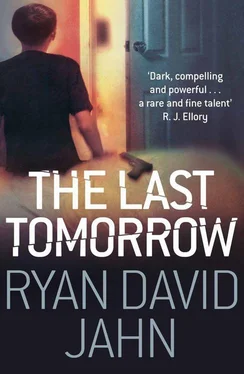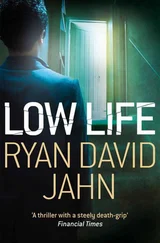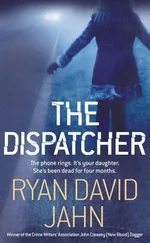Ryan Jahn - The Last Tomorrow
Здесь есть возможность читать онлайн «Ryan Jahn - The Last Tomorrow» весь текст электронной книги совершенно бесплатно (целиком полную версию без сокращений). В некоторых случаях можно слушать аудио, скачать через торрент в формате fb2 и присутствует краткое содержание. Год выпуска: 2012, ISBN: 2012, Издательство: Macmillan Publishers UK, Жанр: Триллер, на английском языке. Описание произведения, (предисловие) а так же отзывы посетителей доступны на портале библиотеки ЛибКат.
- Название:The Last Tomorrow
- Автор:
- Издательство:Macmillan Publishers UK
- Жанр:
- Год:2012
- ISBN:9780230766501
- Рейтинг книги:4 / 5. Голосов: 1
-
Избранное:Добавить в избранное
- Отзывы:
-
Ваша оценка:
- 80
- 1
- 2
- 3
- 4
- 5
The Last Tomorrow: краткое содержание, описание и аннотация
Предлагаем к чтению аннотацию, описание, краткое содержание или предисловие (зависит от того, что написал сам автор книги «The Last Tomorrow»). Если вы не нашли необходимую информацию о книге — напишите в комментариях, мы постараемся отыскать её.
The Last Tomorrow — читать онлайн бесплатно полную книгу (весь текст) целиком
Ниже представлен текст книги, разбитый по страницам. Система сохранения места последней прочитанной страницы, позволяет с удобством читать онлайн бесплатно книгу «The Last Tomorrow», без необходимости каждый раз заново искать на чём Вы остановились. Поставьте закладку, и сможете в любой момент перейти на страницу, на которой закончили чтение.
Интервал:
Закладка:
Teddy shrugs again but says nothing.
‘You’ve worked for Manning a long time. You must now the details of a dozen murders or more. You must know the names of a dozen widows. I don’t want them. All I want is information on his businesses, how they’re financially connected.’
‘I can’t help you.’
‘I want you to think about something. If you give me this information, it’s possible you can prevent more death. It’s possible, if you do this, that you’ll be saving more lives than you’ve taken. You mentioned God earlier. I think God might take notice of the balance of your life, might see you’ve done more good than harm. And if you give me this information, you will have done more good than harm. The card dealer you killed will still be dead, of course, and that’s a terrible thing, a tragedy, but it’s nothing compared to how many lives you can save.’
The district attorney gets to his feet.
‘Think about it,’ he says.
He puts a card onto the metal table and pushes it toward Teddy.
Teddy picks it up and looks at it. Then he looks to the district attorney. He thinks of the card dealer, Francis, lying dead on the asphalt. The red gashes. The white bone beneath. The blank eyes. Blood pouring from him, then the blood stopping as the heart quit beating.
‘If you change your mind about talking to me, call.’
The district attorney picks up his briefcase, turns to the door, and walks away. Teddy watches the door close behind him, then looks once more at the card.
3
On Wednesday, the ninth of April, before the sun has even risen, Seymour Markley sits on the couch in his pajamas, waiting. He’d have taken a shower and dressed, but didn’t want to wake Margaret from her sleep, so he padded out here and here he remains, seated, watching the windows go from black to gray, watching green yards and beige houses and blue sky emerge slowly from the darkness as if surfacing from the depths of some murky sea. He thinks of the phone call he got from Theodore Stuart a mere hour after meeting with him. He thinks of yesterday’s last-minute press conference. He thinks of the future.
A soft thump on the front porch.
Seymour gets to his feet and walks to the door. He pulls it open to see this morning’s paper lying on the welcome mat. He leans down and picks it up. He inhales the cool morning air, glances out to the street, watches the paperboy ride his bicycle deeper into the block and throw a roll of newsprint toward the Smiths’ front door.
And. . thump.
He steps back into the house, closing the door gently behind him.
Back at the couch he sits down and opens the paper. His photo dominates the front page below the fold. His hair combed neatly. His mouth open in silent speech. Fist gripping a copy of a comic book.
As he reads the accompanying text, a smile touches his lips.
TWELVE
1
On Monday morning, the seventh of April, while Seymour Markley is asking his chief investigator Barry Carlyle to look into a rather important matter and get back to him before the end of the day, and three days before Eugene Dahl will come home to find an envelope nailed to his front door, Sandy Duncan is sitting on a white-painted school bus, looking out the window at the world as it passes by; he sees a blur of color as the road moves under him, as it sweeps beneath the bus like a great gray ribbon, bringing the juvenile-detention facility closer to him, and closer still.
2
He spent the night in a holding cell with several other boys, most of whom were older than him, as most of the boys on this bus are older than him. It was frightening. He couldn’t sleep at all. He lay awake, listening to thirty or fourty other boys breathing, snoring, yelling out in their sleep. He thinks he heard someone masturbating. He thinks he heard someone else weeping almost silently. He knows early this morning he heard someone’s muffled cries as he was punched repeatedly, and when sunlight arrived he saw a boy of fourteen or fifteen sitting alone in the corner with a face both purple and bloody.
They were given food, gray undifferentiated slop they called oatmeal, served in dented metal bowls like dog-food dishes.
Then, after breakfast, a white-painted school bus arrived. He heard its engine’s rumble through the large holding cell’s single window.
A guard called out names and the boys were lined up alphabetically and marched to the bus. Sandy was, of course, among them. A Negro boy of fifteen or sixteen walked behind him and once they were on the bus sat beside him. They looked at one another and nodded but didn’t speak. The boy had a cane in his hand. Sandy looked from the cane to his feet and saw polio braces jutting from his pants, hooking under the heels of his shoes. He thought of the polio scare two years ago at the public swimming pool. Part of him had wished he would get polio. He could die and everyone who’d been so mean to him would regret everything they’d done. They’d go to his funeral and weep and apologize. It would be incredible.
The bus continued to fill with people.
In less than ten minutes the seats were full. The doors closed with a hydraulic hiss. A guard called out names again, ensuring everyone was on his bus, then counted heads to make sure no one answered for someone who wasn’t actually present.
After that the bus rolled out into traffic.
3
They’ve been on the road for fourty-five minutes or more now, heading east, moving further inland. The densely packed streets of downtown Los Angeles have given way to quiet suburbs, which have in turn given way to occasional industrial buildings emitting noxious fumes and foul smells.
And finally they arrive.
They pass the front of the institution. It could almost be a normal high school or university campus, except it’s surrounded by an eight-foot fence topped with barbed wire, and there are guards, and no one’s leaving at the end of the day — not him or any of the other boys in here with him, anyway.
The bus makes a left turn into a dirt driveway. Dust wafts into the air behind them. When the bus reaches a metal gate the driver honks his horn. A moment later the gate is pulled open by a guard in a khaki uniform. He stands aside while the bus rumbles past him, sending dust flying into his face.
Once the bus has passed him he closes the gate.
Sandy can see the buildings before him, all brick and mortar, thick walls and small black windows reflecting no life or light. The closer they get the less it seems it could be a normal campus, the more it seems some great inorganic beast reaching for him, reaching out to him, wanting to take him into its guts and never let him go.
He misses his mother. He feels the sting of tears in his eyes. He sniffles.
‘Don’t cry,’ the Negro boy says to him, the first words he’s spoken.
Sandy blinks several times to clear his vision and looks at him. The boy looks back with kindness and understanding.
‘You can’t let nobody see you cry around here,’ he says. ‘If you need to cry, lock yourself in a toilet stall and try not to make no noise. I’m serious.’
Sandy nods and wipes his eyes with his knuckles.
A moment later the bus comes to a jerky stop in front of the building.
The brakes hiss.
Sandy swallows. He’s arrived.
4
The bus doors sigh open. The guard standing at the front, by the driver, tells them to get off the bus in an orderly fashion, one row at a time. The boys in the front seats stand and start out, followed by those in the seats behind them, and so on. It looks as though many of the boys have been through this before. Sandy’s glad of that. He can just watch them and do what they do and not stand out. If he does that he might be able to make it through this.
Читать дальшеИнтервал:
Закладка:
Похожие книги на «The Last Tomorrow»
Представляем Вашему вниманию похожие книги на «The Last Tomorrow» списком для выбора. Мы отобрали схожую по названию и смыслу литературу в надежде предоставить читателям больше вариантов отыскать новые, интересные, ещё непрочитанные произведения.
Обсуждение, отзывы о книге «The Last Tomorrow» и просто собственные мнения читателей. Оставьте ваши комментарии, напишите, что Вы думаете о произведении, его смысле или главных героях. Укажите что конкретно понравилось, а что нет, и почему Вы так считаете.












